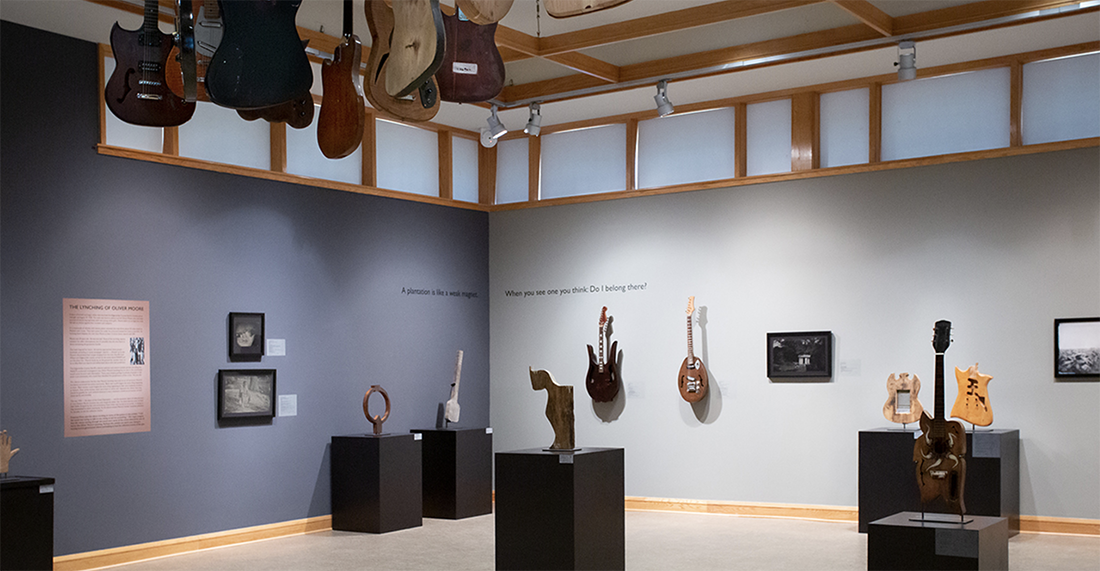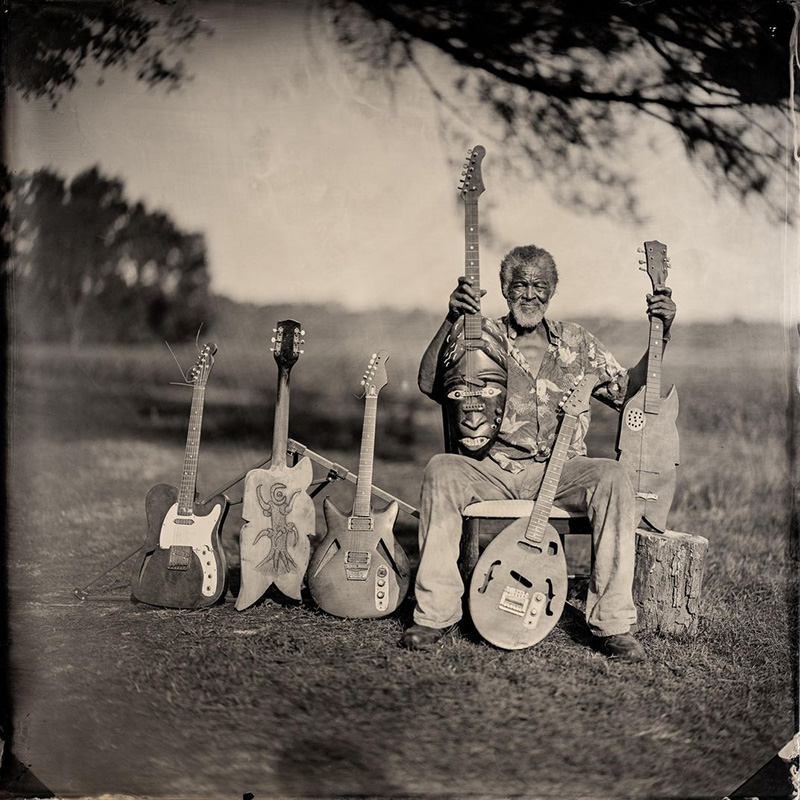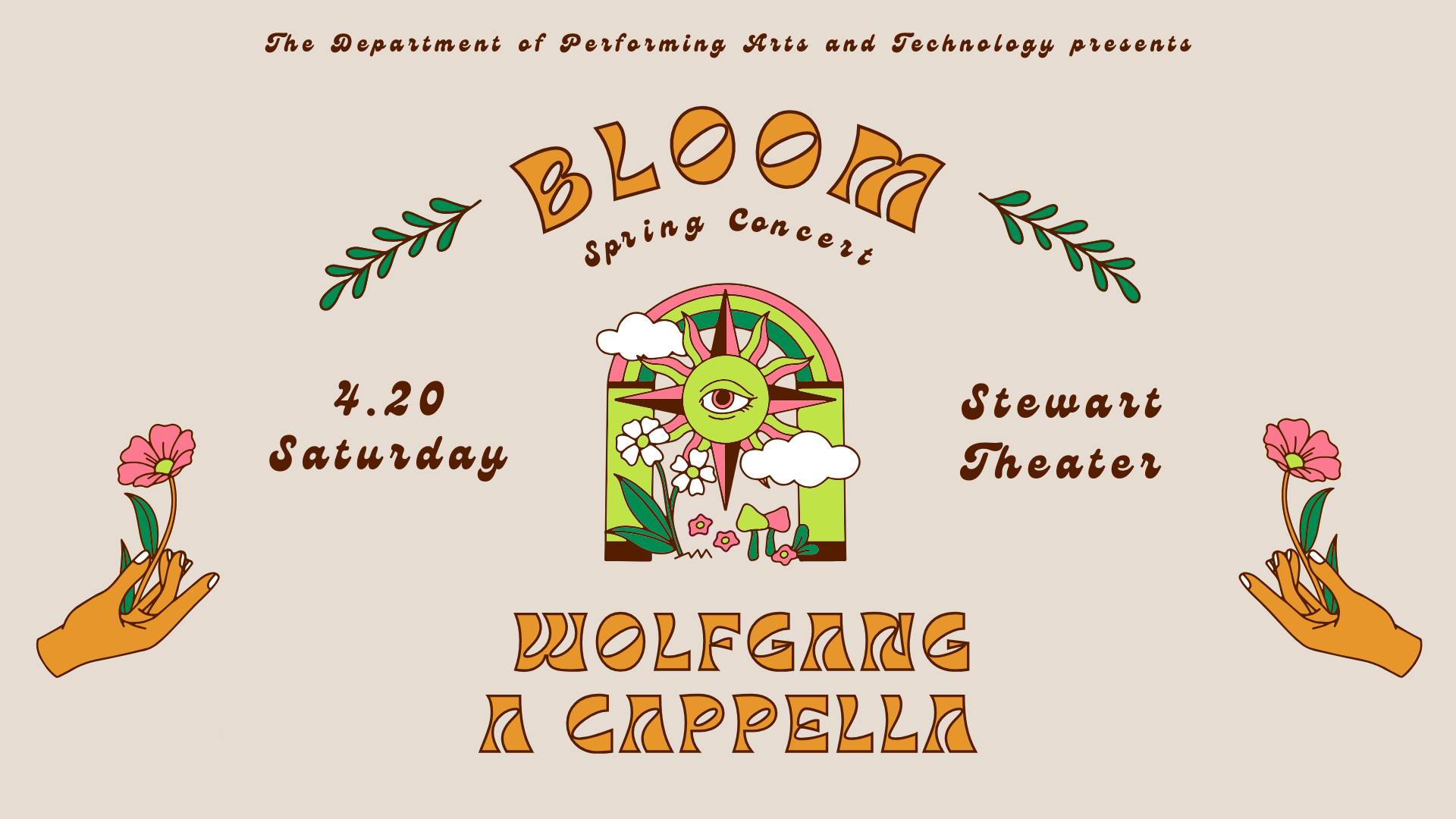NC artist’s unique handcrafted guitars tell a powerful story

Music and art are powerful storytelling mediums. They have long been used to give voice to our joy and our suffering. The handcrafted guitars made by Freeman Vines of Fountain, NC tell a complex story of history, ecology and spirituality, which began with a quest to capture a unique sound that Vines could not get out of his mind. For decades he built guitars by hand using only found materials. Eventually his focus shifted away from his quest for a sound to an emphasis on the unique characteristics and history of the wood he found, allowing the wood to guide the design as he created singular sculptural guitars.
Around 2015, Vines was given three pieces of black walnut wood that he was told came from a tree used for lynchings. He hesitated to work with the wood, haunted by the idea of the pain that it contained. This was when he first met Timothy Duffy, the founder and executive director of Music Maker Relief Foundation. Duffy and the foundation took an interest in Vines and his guitars and provided financial support. As Vines began working with the wood from the hanging tree, Duffy and folklorist Zoe Van Buren joined him on his quest to understand the stories behind the wood. They researched accounts of Oliver Moore, a 29-year-old black man who had been lynched in 1930 just a few miles from where Freeman Vines was currently living in Fountain. Their collaboration led to a book entitled Hanging Tree Guitars in which Van Buren extracted passages from conversations with Vines to allow the story of the hanging tree guitars to emerge through Vines’s own voice. Accompanying the text are some of Duffy’s tintype photographs of Vines, his guitars and his surroundings. The book set the stage for the development of an exhibit, at which point Department of Music lecturer Will Boone was invited to join the project.

Boone is a musician and an ethnomusicologist who teaches courses on the history of popular music at NC State. His doctoral research centered around contemporary Black gospel music in a Durham church, and he had collaborated previously with Music Maker Relief Foundation to write the extensive liner notes for Labor of Love, the 2016 release from Grammy Award-winning blues legend Taj Mahal, as well as several articles for their blog.
Boone first visited Freeman Vines with Timothy Duffy in 2016 or 2017, before Vines began working on the hanging tree guitars. Boone was immediately inspired by Vines and his creations. “To take these things and turn them into electric guitars is fascinating,” Boone said about the found materials that Vines uses to build his instruments, which include wood from a mule trough and an old tobacco barn, to name a few. “It’s not like he’s trying to recreate a Fender or Gibson or something, just totally unique designs. And he understands all of this—he sees the connection between his feelings about spirituality and his feelings about music and the land and it all comes together in these guitars. I was just fascinated by him as a person and his work. So when I had the opportunity to work on the project, I think just getting the word out about him and having the opportunity to put these things into a cultural context, that was exciting to me.”
Boone helped Music Maker Relief Foundation write a grant application to the National Endowment for the Humanities, and signed on to write essays that would accompany the guitars in the exhibit, to provide historical and cultural context.
Around this time, protests were underway across the United States and the world in response to the killings of George Floyd, Ahmaud Arbery and Breonna Taylor. While Boone was researching and writing about the connections between Vines’s work and the historical injustices suffered by Black Americans, he was also grappling with injustices suffered by Black Americans today. “I was writing an essay on the [Ku Klux Klan] and I heard about George Floyd’s death right at the same time,” he said. “So the confluence of these things, it was actually really heavy. It was an emotionally intense experience for me—and that’s for me. I can’t imagine what it was like for a lot of people in this country. I think some things about this project, it shows that a lot of things don’t change, sadly.”
Many of the injustices caused by systemic racism in America, such as the lynching of Oliver Moore in 1930, have never been addressed and the resulting pain and division in our communities remains unprocessed. “I think there was something about the guitars [Freeman Vines] was making that was giving voice to—whether it was Oliver Moore or it was voices that had not been heard, that had not been part of the healing process—I think through his art he gives voice to something that has been silenced. Kept silenced. And by bringing it out, it’s not some magical healing where you go see the exhibit and all of a sudden racial tensions are healed forever, but it opens up a door where people can start to discuss these things and come to them in a way that has creative and generative energy versus energy that’s all about being divisive.”
“The instrument is something that creates music and gives voice to sounds and energies. It releases sound waves and brings people together and allows people to express themselves. So just symbolically—as something that can give voice and tell a story—I tried to bring that into my writing. I like that idea.”
Will Boone
The challenge in writing about heavy subjects like racism in America is presenting the material in a way that’s accessible and hopefully encourages introspection, dialogue and growth, rather than division. Boone spent a lot of time thinking about what he wanted museum visitors to take away from the experience of seeing Vines’s guitars and reading his historical texts. “I guess ideally what they would come away with is a willingness to search their own heart. To look into themselves and ask where they fit in this picture where so many people have had to face injustice and where we have this history and this legacy of violence. Where do they fit? In what ways are they making the situation better, in what ways are they complicit? And not to come away with a sense of blame or like, ‘We live in such a terrible place, there’s so many terrible people.’ But sort of like a reflective mode of how can I be better…What can I find within myself and maybe how can I be inspired by this creativity that I see to put something better into the world?”
If that sounds like a lot to ask of a guitar, take a look at the guitars and see the story of injustice, suffering and community silence contained in them, along with the joy, playfulness and harmony that Vines brings to his art. His guitars blur the lines between music and visual art, two powerful traditions used by generations of African American artists to tell their stories.
“There’s really something about his work that’s more visual art than it is music,” said Boone. “Some of his guitars are not even playable. He doesn’t always string them. There’s not even always a neck on the guitar. Sometimes they’re just bodies. They can be in any stage that he might get to and feel like it’s done. I think it’s interesting how his work sort of falls in the middle of those things. The guitar maybe is a connection between those two southern African American traditions, between the visual art and the music. I think his work is sort of bringing those together.”
Boone had the opportunity to play some of the guitars when he first met Vines, and he wrote about the experience for the Music Maker Relief Foundation’s blog. “They sounded cool. They were raw. There were certain things that you could play on them and it sounded great, that really had a character,” said Boone. “But if you were like a super guitar nerd guy, if you were all about technical perfection, this is probably not the guitar you want to play. They really had a unique character. And there’s a rawness, a grittiness. The sound of the guitars reminded me a lot of the man himself. You could definitely feel his personality coming through.”
The exhibition, Freeman Vines: Hanging Tree Guitars, premiered in July at the Greenville Museum of Art in Greenville, NC, and will remain there until January 9, 2020. It will travel to the Southeastern Center for Contemporary Art in Winston-Salem, NC opening on June 9. You can also visit it virtually through the Hanging Tree Guitars website, where you can hear from Freeman Vines himself, see the guitars, and read Will Boone’s essays for cultural and historical background for these artworks.


